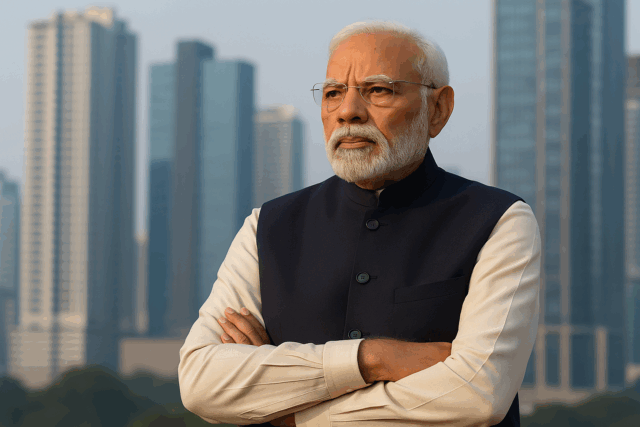Prime Minister Narendra Modi is preparing for a landmark diplomatic visit to Ghana, Namibia, and Trinidad and Tobago, set to begin on July 2, 2025.
This multi-nation tour marks Modi’s first official trip to these countries and underscores India’s growing push to expand its strategic and developmental footprint in Africa and the Caribbean, especially amid intensifying global competition with China.
The visit is widely seen as a calculated step to deepen India’s role as a trusted, long-term partner in regions where China has established a dominant presence. India’s approach emphasizes inclusive development, democratic values, and capacity-building over high-debt infrastructure investments.
For over two decades, China has led the engagement narrative in Africa, pouring in massive investments and launching large-scale infrastructure projects. India, while not matching China in financial scale, is pursuing a distinct model rooted in people-focused development, vocational training, healthcare, and information technology.
“India’s engagement with Africa is independent and grounded in mutual priorities,” says Abhishek Mishra, Associate Fellow at the Manohar Parrikar Institute for Defence Studies and Analyses. He highlights India’s strengths in ICT, human resource development, agriculture, and affordable healthcare.
Ghana is a key stop on Modi’s itinerary. Bilateral relations are already strong, with India ranked among the top five investors in the country. Since 1994, Indian businesses have backed more than 820 projects in Ghana, totaling $1.92 billion. In 2024 alone, Indian FDI amounted to $16.46 million across various sectors including manufacturing, agriculture, and services.
Trade is also significant—India is a major importer of Ghanaian gold. Now, the relationship is set to broaden into security cooperation, particularly in response to rising threats from extremist groups like ISIS and Boko Haram in West Africa. India is expected to support Ghana with counter-terrorism training and strengthen ties between the Kofi Annan UN Peacekeeping Centre and New Delhi’s Centre for UN Peacekeeping.
Both nations continue to push for a global consensus on terrorism through the long-pending Comprehensive Convention on International Terrorism (CCIT) at the UN, advocating for a united stance against all forms of terrorism.
India’s relationship with Namibia has gained momentum following the 2022 cheetah translocation initiative. Namibia’s gifting of eight cheetahs to India to support the species’ reintroduction symbolized a deepening partnership in environmental diplomacy.
Beyond wildlife conservation, trade between the two nations stands at approximately $240 million, covering mining, services, and manufacturing. India also plays a major role in human capital development in Namibia, providing scholarships and training under programs like ITEC and ICCR.
Given Namibia’s strategic Atlantic coastline, maritime security is a rising priority. Both countries are expected to enhance cooperation to safeguard sea lanes and tackle piracy, reinforcing India’s role as a maritime security provider.
PM Modi’s visit to Trinidad and Tobago will celebrate shared heritage and deep-rooted ties with the Indian diaspora, which comprises nearly 40% of the country’s population. Indian influence is prominent in the cultural, political, and economic life of the nation.
The visit will focus on expanding cooperation in digital connectivity, education, and trade facilitation. Strengthening links with the diaspora is also seen as part of India’s broader strategy to foster enduring cultural and strategic partnerships in the Caribbean.
Modi’s tour is viewed as a prelude to the long-awaited India-Africa Forum Summit (IAFS-IV), the last of which was held in 2015. With the African Union recently inducted into the G20 under India’s presidency, New Delhi is reinforcing its diplomatic and development priorities across the continent.
India’s key areas of cooperation include:
- Digital Infrastructure: Countries like Ghana and Namibia are exploring India’s UPI and RuPay platforms for financial inclusion.
- Agriculture: India’s climate-smart and small-scale farming practices offer solutions for African food security.
- Pharmaceuticals: Indian firms remain vital suppliers of affordable medicines, particularly in Africa’s meningitis belt.
- Skills Training: Vocational education and IT training continue to be central to Indian engagement.
- Financial Support: India is encouraging rupee-based credit lines to reduce forex dependency.
India is also enhancing its military and maritime presence across Africa. Earlier this year, it conducted the AIKEYME 2025 maritime drills with 11 African nations off Tanzania’s coast, focusing on anti-piracy and naval coordination.
New Delhi is ramping up security collaborations with countries like Nigeria, Ethiopia, Mauritius, and Seychelles—offering equipment, training, and maritime domain awareness.
While China has established a military base in Djibouti and pledged $140 million in defence aid through its FOCAC 2025–2027 plan, India’s approach emphasizes cooperation, interoperability, and capacity-building over direct military presence.
China remains Africa’s second-largest trading partner (after the EU), with 2023 trade valued at $283 billion. India, while lagging at $67 billion, is catching up through private-sector driven initiatives in pharma, IT, agro-processing, and infrastructure.
India’s long-term vision includes its “Diamond Necklace” strategy—a counter to China’s “String of Pearls”—aimed at securing vital Indian Ocean trade routes and increasing strategic engagement with maritime nations.





